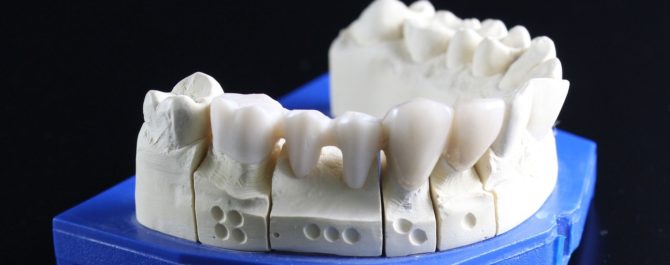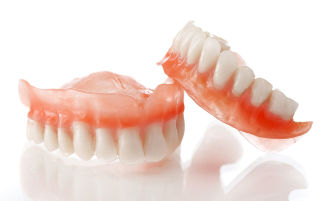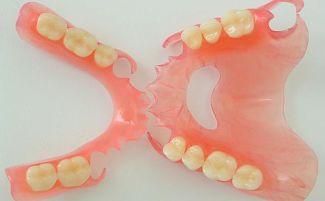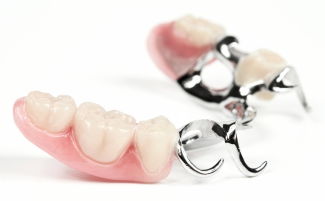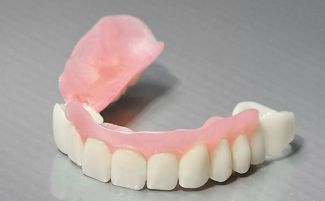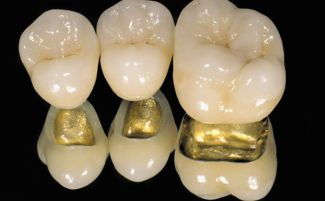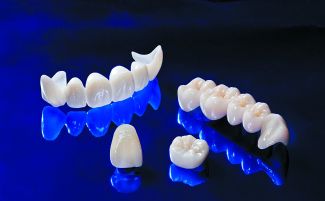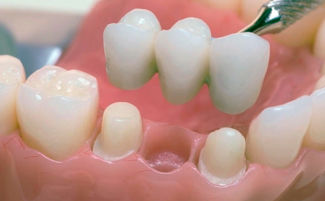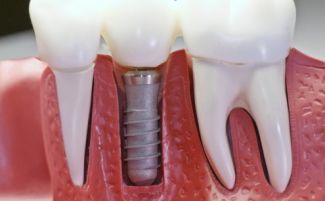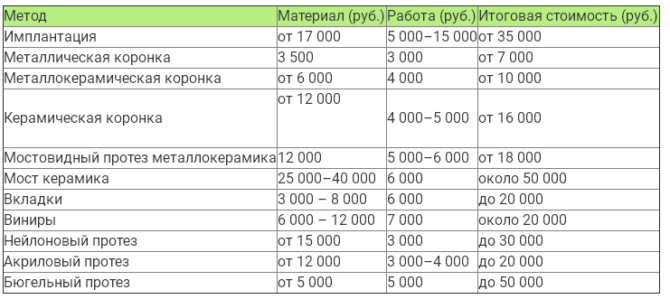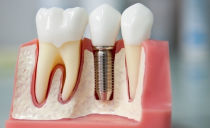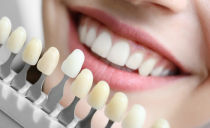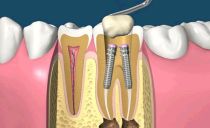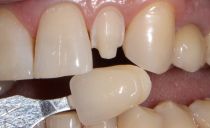The types and cost of false teeth, which is better, how to save
To insert teeth, you do not have to earn a lot, have rich relatives or save for a long time. Today there are many inexpensive models of dental prostheses, and part of the costs of dentistry can be borne by the state.
Content
Types of prosthetics
All prosthetic structures can be divided into several categories:
- removable:
- acrylic;
- nylon;
- arch prostheses;
- dentures "sandwich";
- fixed:
- crowns (ceramic, metal, zirconia, cermets);
- bridges;
- veneers;
- stump tabs on the pins;
- implants
- conditionally removable;
- temporary implant prostheses (installed during the manufacture of a permanent structure).
The feasibility of installing certain prostheses depends on the age, condition of the teeth and oral cavity, and the financial capabilities of the patient. If you need to insert teeth inexpensively, then you should focus on removable dentures and metal crowns.
Removable acrylic constructions are considered the cheapest option for dentures in the complete absence of teeth. With a partial shortage of dental units, metal crowns will become an economical option.
Features of removable structures
Removable prosthetics is used with full adentia and the inability to install implants. The main feature of these designs is that they need to be periodically removed from the mouth for cleaning.
Plastic and nylon prostheses are considered the simplest type of false jaws. They can be safely inserted into people with various chronic pathologies. Clasp dentures are more complex designs and come in two types:
- unilateral - simple;
- bilateral - complex.
Clasps or locks are used as fasteners in clasp systems. The former are noticeable in conversation due to metal inserts, the latter are invisible.
Photos of removable structures
Features of fixed structures
The decision on the use of fixed prosthetics is made by the doctor. For patients without serious chronic pathologies, conventional bridges and crowns are inserted. Most often, for the manufacture of crowns, the following compositions are used:
- cobalt chrome;
- gold;
- ceramic;
- ceramic-metal.
Insertion of teeth made of cermets, ceramics or other material is carried out in a few visits. First, the doctor examines the patient’s oral cavity, treats tooth decay and other diseases present, cleans teeth from plaque and stone, grinds the prosthetic tooth and takes a jaw cast from which the technician will make the crown.
Making a crown takes from several days to a week, for this period the patient is given a temporary plastic product. At the next visit to the clinic, the crown is tried on, and if it does not need to be fitted, it will be installed on permanent cement.
Tabs and veneers are used for minor dental defects (chips, cracks). Implants are placed in case of complete tooth decay. There are certain contraindications to the installation of such structures:
- AIDS;
- diabetes;
- hepatitis;
- severe atrophy of bone tissue;
- tuberculosis.
Today, with these pathologies, basal implantation (ROOTT, ALL-ON) is often used, although many dentists doubt the effectiveness of such technologies. In other cases, prosthetics are performed according to classical protocols.
Photos of fixed structures
How much does it cost to insert teeth: removable and non-removable prosthetics
To find out how much it costs to insert teeth, you can only at the dentist's appointment. Below are the approximate minimum prices for prosthetics based on open price lists of individual dental clinics. In different regions, these figures may vary.
The cost of inserted acrylic (plastic) dentures for one jaw (upper or lower) starts from 6–7 thousand rubles, nylon - from 15 thousand rubles. Clasp constructions will cost more, their exact cost depends on the chosen type of fastening and material. Prices start at 20 thousand rubles. Such a high cost is associated with the use of a metal frame and clamps.
When installing a metal crown, you will have to pay an amount of 1 thousand rubles, the minimum cost of ceramic crowns (cermets) is 15–20 thousand rubles. Implants are more expensive, the exact cost of their installation depends on the number of prosthetic units, structural features of the jaw and associated pathologies. Dental implantation prices start at 20-30 thousand rubles. for one tooth.
The approximate cost of all types of prosthetics is shown in the table:
What is the cost of prosthetics
The cost of prosthetics depends on several factors:
- the size of the required design (one crown is cheaper to put than several);
- materials (gold or ceramic crowns at a price more expensive than simple metal);
- use of special equipment;
- application of new technologies;
- preparation for prosthetics;
- doctor's work;
- region where the clinic is located (making false teeth more expensive in Moscow than in Saratov);
- prestige of a medical institution (it is better to focus on quality, rather than on regalia).
The more experienced dentists, modern equipment and the most famous clinic, the more expensive prosthetics will be. But teeth can be inserted in less prestigious medical facilities. Not always the lack of certificates and regalia indicates the unprofessionalism of doctors, you can find a good specialist and at quite budget prices.
If for some reason there is no desire to contact commercial dentistry, you can pay for the installation of teeth in the self-supporting department of the state clinic. Then the treatment of caries, periodontal disease and other dental pathologies will be free, and for the insertion of crowns or implants you will have to pay for a very gentle price.
How much does it cost to insert new teeth in a self-supporting department of a state clinic, you need to find out in the medical institution itself. There is no single tariffication; prices are set by the head physician of the organization on the basis of internal orders, market prices and recommendations of the Ministry of Health.
How to save on prosthetics
Even a loose tooth can be saved. If the dental root is preserved, then it is not necessary to remove it - due to special composite materials and pins, the crown of the tooth can be restored. The whole procedure will cost about 5–10 thousand rubles, and not 20 thousand rubles, if we take as an example the implantation of one dental unit or the installation of a ceramic-metal crown.
Also, with removable and non-removable prosthetics, you can:
- Save on materials from which the installed crowns will be made. If you want to put a tooth that is not in the smile zone, then you can do with a metal crown. It is not white and does not look aesthetically pleasing, but it perfectly performs a chewing function and is cheaper.
- Place a removable prosthesis instead of a permanent implant.Outwardly, they differ little from ordinary teeth, but at first they cause discomfort when worn.
If you want to install a dental bridge, you may prefer an adhesive prosthesis for it, which does not require turning of adjacent teeth. It costs less than conventional dental designs.
To restore the front teeth, metal crowns can be used. The material quickly becomes worthless with intensive chewing, therefore it is not suitable for the restoration of molars. After 2-3 years, the design will have to be changed, but as an express method, this method of prosthetics is successful.
Before the start of the examination, it is recommended to call private and public clinics and find out how much it costs to make teeth in their institutions. Having compiled a comparative table, it will be possible to choose the optimal dental clinic in a given budget.
Is it possible to put teeth at the expense of the state
If a person officially works and deducts personal income tax, then he can receive a tax deduction for prosthetics. For conventional treatment, it is equal to 120 thousand rubles, for expensive (dental implantation) - it can equal the total cost of prosthetics. Only those who pay income tax can apply for this benefit. Pension is not taxed with such tax, therefore pensioners have the right to receive a tax deduction for a false tooth only in two cases:
- if they retired less than 3 years ago;
- if they keep their savings in NPFs.
Assays before prosthetics
Before dental prosthetics, the following studies are prescribed:
- general blood test (to determine inflammatory processes in the body);
- blood test for:
- HIV: enzyme immunoassay, p24 antigen analysis, PCR;
- hepatitis;
- syphilis;
- sugar (with diabetes);
- coagulability;
- computed tomography (prescribed for fixed prosthetics);
- allergic tests (teeth must not be inserted if there is a risk of allergies).
These studies, carried out before the insertion of teeth, help to avoid complications. The choice of material that a person is allergic to, at best, will lead to the ordering of a new crown, at worst - to death from Quincke's edema. If you do not have a CT scan before implantation, the doctor may affect important blood vessels during the operation. And the presence of serious inflammatory diseases is a contraindication to some types of prosthetics.
Dental Disease Prevention Methods
In case of tooth loss, only a few rush to the dentist to put a crown or other design. But defects in the dentition can lead to a lot of dental problems in the future: the load on the jaw will be redistributed, the bite will change, due to which neighboring teeth will undergo great mechanical stress, wear out and crumble. After some time, it will be necessary to install not one crown, but several dentures, as well as paid treatment of caries or even periodontal disease.
You should not save on professional brushing. You need to do it at least 2 times a year. The cost of cleaning at the dentist is not more than 3 thousand rubles, which is much cheaper than the prices of prosthetics and treatment. Such prevention provides protection against gingival pathologies, reduces the risk of caries and tartar, and reduces the risk of tooth loss.
The installation of artificial teeth is an expensive service that is not covered by a compulsory health insurance policy. Before starting work, you must evaluate your own financial capabilities. Putting very bad crowns that will fall out in six months is unprofitable, it is better to dig up on high-quality designs that will stand for many years.

